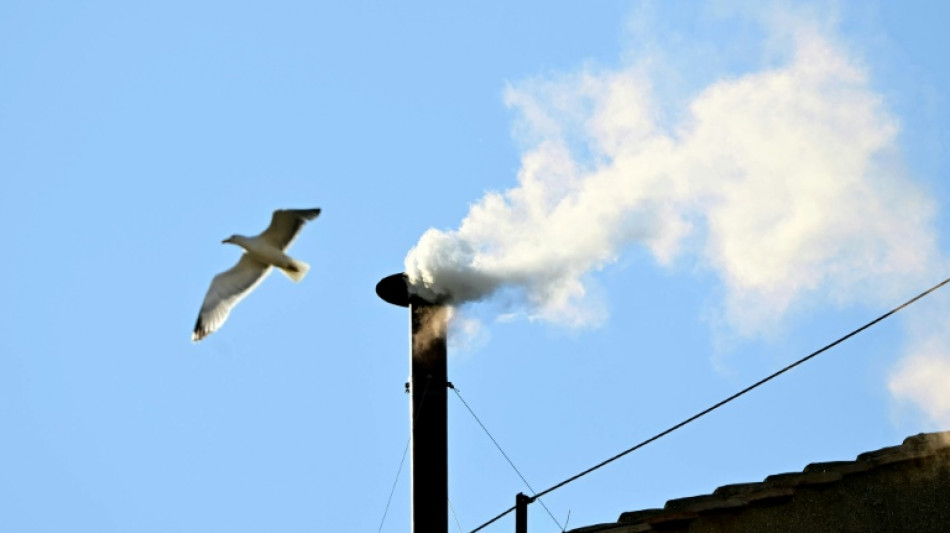

White smoke signals Catholic Church has new pope
White smoke billowed from the chimney of the Sistine Chapel on Thursday, signalling that cardinals locked inside have elected a new leader for the world's 1.4 billion Catholics.
Thousands of pilgrims and curious onlookers in St Peter's Square cheered, applauded and wept as the smoke appeared on the second day of voting at the Vatican.
The bells of St Peter's Basilica and churches across Rome rang out, indicating the 2,000-year-old Church has its 267th pope.
All eyes now turn to the balcony of St Peter's, to see who has been elected to succeed Pope Francis, an Argentine reformer who died last month after 12 years as leader of the worldwide Church.
The new pontiff will be introduced in Latin with his chosen papal name and address the world for the first time.
"It's an amazing feeling," said an elated Joseph Brian, a 39-year-old chef from Belfast, who came with his mother to Rome for the spectacle.
"I'm not an overly religious person but, being here with all these people just blew me away," he told AFP as people around him jumped up and down in excitement.
There were euphoric scenes as one priest sat on someone's shoulders waving a Brazilian flag and another lifted a heavy crucifix into the air in jubilation.
- 'Habemus Papam' -
"It's a once in a lifetime experience" said Rita Canale, a 42-year-old Roman who came to the square with her 8-year-old daughter.
Bruna Hodara, 41, from Brazil, was recording the scene with her phone. "Habemus papam, woooo!" she howled, echoing the words to be spoken on the balcony as the new pope is introduced.
The new pope faces a momentous task: as well as asserting his moral voice on a conflict-torn global stage, he faces burning Church issues from the continued fall-out from the sexual abuse scandal to the Vatican's troubled balance sheets.
Some 133 "Princes of the Church" from five continents -- the largest conclave ever -- began voting on Wednesday afternoon.
Sworn to secrecy, on pain of excommunication, their only means of communicating their progress to the outside world was by sending up smoke through the chimney of the Sistine Chapel.
On Wednesday evening and then again on Thursday lunchtime, the smoke was black, emitting disappointed sighs from the tens of thousands watching.
But on Thursday afternoon just after 6pm (1600 GMT) the smoke emitted was white, confirming that the Catholic Church has a new spiritual leader.
It was not clear exactly how many ballots it took to elect the new pope, but it followed recent history in wrapping up in less than two days. In 2005, Benedict XVI was elected in four ballots and Francis in 2013 in five ballots.
While the details of the election will forever remain secret, the new pope had to secure at least two-thirds of votes to be elected.
By tradition, he now enters the Room of Tears -- where freshly-elected popes give free rein to their emotions -- to don a papal cassock for the first time, before returning to the Sistine Chapel so the cardinals can pledge their obedience.
He will then appear on the balcony along with a senior cardinal, who will announce to the waiting crowds "Habemus Papam" ("We have a pope").
The pope will then give a short speech and impart his first "Urbi et Orbi" ("To the City and the World") blessing.
- Pastor or diplomat -
The election has come at a time of great geopolitical uncertainty, which was seen as a key voting issue, along with the rifts within the Church.
Francis was a compassionate reformer who prioritised migrants and the environment, but he angered traditionalists who wanted a defender of doctrine rather than a headline-maker.
That was no guarantee, however, that the cardinals would pick someone in his vein.
The question was whether to choose a pastor or diplomat, a liberal or conservative, someone versed in the Curia -- the Church's governing body -- or a relative outsider from areas of the world where Catholic faith is thriving.
Before the cardinals were locked into the Sistine Chapel Wednesday, their dean Giovanni Battista Re urged them to choose someone able to protect the Church's unity.
The Church has also had difficulty in adapting to the modern world, with declining priest numbers and increasingly empty pews in the West.
The papal inauguration usually takes place less than a week after the election with a mass celebrated before political and religious leaders from around the world.
The new pope will likely do a tour of St Peter's Square in his popemobile for the first time, before delivering a homily outlining his priorities.
S.Pillai--MT


